#PrimeMinisterRishiSunak
Text
UK Investment Summit Spurs Economic Transformation
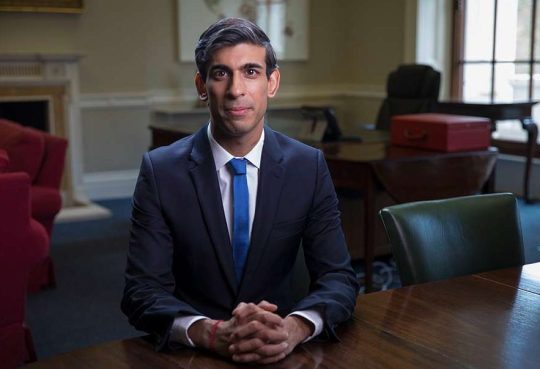
Transformative Investments Drive Growth Across Thriving Sectors
In a groundbreaking announcement, Prime Minister Rishi Sunak has unveiled an impressive £29.5 billion in new investments targeting the UK's most dynamic sectors. This unveiling took place at the Global Investment Summit at Hampton Court Palace, attracting A-list CEOs and investors from around the world.
Boosting Innovation: Investments in Key Sectors
These transformative investments, totaling over £29 billion, are set to revolutionize sectors such as tech, life sciences, infrastructure, housing, and renewable energy. The strategic focus on these areas aims to create thousands of new jobs and stimulate growth across the entire country.
Levelling Up: Thousands of Jobs Created
The summit represents a significant stride towards the government's commitment to leveling up, with over 12,000 jobs slated to be created from today's investments alone. This momentum builds on recent initiatives, including the £4.5 billion Advanced Manufacturing Plan and a £2 billion investment from Nissan securing thousands of jobs in Sunderland.
Regional Impact: Jobs Surge Across the UK
Last year witnessed the creation of nearly 26,000 jobs in the North West and North East through inward investment projects. Yorkshire and The Humber saw over 7,000 new jobs, while the Midlands experienced an influx of 11,000 jobs. The government's commitment to regional development is evident in these substantial job creation numbers.
Global Summit Kickoff: CEOs and Government Leaders Gather
The summit's grand opening, led by Prime Minister Rishi Sunak and Business & Trade Secretary Kemi Badenoch, saw the participation of notable CEOs, including Stephen Schwarzman from Blackstone, Amanda Blanc at Aviva, David Soloman from Goldman Sachs, and Jamie Dimon at JP Morgan Chase. Principal Partners Barclays, HSBC, and Lloyds Bank also lent their support.
Celebrating British Ideas: From Past to Future
The summit's theme, "British Ideas – Past, Present, and Future," captures the essence of the event, exploring innovation from the steam train to quantum computing. The day concludes with a reception at Buckingham Palace hosted by His Majesty the King.
Prime Minister Rishi Sunak's Optimistic Outlook
Prime Minister Rishi Sunak expressed confidence in the UK's economic future, stating,
"Today’s investments, worth more than £29 billion, will create thousands of new jobs and are a huge vote of confidence in the future of the UK economy."
Sunak emphasized the nation's appeal to global CEOs, citing recent initiatives, including substantial tax cuts for businesses.
Nurturing Innovation: Inward Investment for Key Industries
Sunak highlighted the centrality of global investment to his economic growth plan, emphasizing funding pouring into vital industries like clean energy, life sciences, and advanced technology. Inward investment, Sunak asserted, is the driving force behind high-quality job creation and widespread economic growth.
Chancellor's Recent Moves: A Business-Friendly Landscape
These new investments follow Chancellor Jeremy Hunt's recent announcement of the biggest business tax cut in modern history during the Autumn Statement. The permanent extension of capital allowances, business rates support, and the £7 billion Growth Fund all contribute to creating a business-friendly environment.
Sustainability Boost: Investments in Renewable Energy
In a significant boost for Net Zero and the UK's renewables sector, Iberdrola confirmed £7 billion of investment, while North Star committed £500 million and 400 new jobs to offshore wind infrastructure. This aligns with a surge in inward investment for renewables, rising from £19 billion in 2021 to £55 billion in 2022.
IFM Investors and Aware Super: Australian Commitments
IFM Investors pledged £10 billion for large-scale infrastructure and energy transition projects, showcasing a partnership with the UK Government. Simultaneously, Aware Super committed over £5 billion for various projects, citing the benefits of the Australia-UK Free Trade Agreement and the ease of doing business in the UK.
Tech Sector Surge: Microsoft's £2.5 Billion Pledge
The UK's thriving tech sector receives a substantial boost with Microsoft's commitment of £2.5 billion to build critical AI infrastructure. This includes next-generation AI data centers and thousands of graphic processing units, reinforcing the UK's position as an AI Superpower.
Oxford Quantum Circuits and BioNTech: R&D Investments
Oxford Quantum Circuits announced a £106 million R&D fundraising for quantum computing projects, aligning with the government's National Quantum Strategy. BioNTech, a leader in biotechnology, shared plans for a £1 billion investment in R&D activities, including a new laboratory in Cambridge.
Commitment to the Future: Building a Sustainable Economy
These diverse investments underscore the UK's commitment to building a sustainable and innovative economy. From quantum computing to renewable energy and biotechnology, the government's strategic approach aims to position the UK as a global leader in cutting-edge technologies.
Sources: THX News, Prime Minister's Office, 10 Downing Street, Department for Business and Trade, The Rt Hon Kemi Badenoch MP, & The Rt Hon Rishi Sunak MP.
Read the full article
#BioNTechUKR&Dexpansion#Businesstaxcuthistory#GlobalCEOsandinvestors#Levellingupeconomicgrowth#MicrosoftAIinfrastructurepledge#OxfordQuantumCircuitsR&D#PrimeMinisterRishiSunak#RenewableenergyinvestmentsUK#TransformativeinvestmentsUKsectors#UKinvestmentsummit
0 notes
Text
Multi Billion Pound Investment to Transform UK Energy Scene

Ambitious plans to scale up affordable, clean, homegrown power and build thriving green industries in Britain have been unveiled by the government today (Thursday 30 March) - boosting the country’s energy security and independence and reducing household bills for the long term and maintaining a world-leading position in achieving net zero.
Putin’s illegal invasion of Ukraine had a devastating effect on global energy markets, forcing up wholesale prices and with it the energy bills of households and businesses in the UK and around the world.
In response, the government has taken steps to shield consumers and companies from the worst effects, paying around half a typical household’s bill over the winter and half the wholesale energy costs paid by some businesses.
After decades of reliance on importing expensive, foreign fossil fuels, the government is delivering a radical shift in our energy system towards cleaner, more affordable energy sources to power more of Britain from Britain.
In doing so, plans will help deliver on the Prime Minister’s promise to grow the economy across the country, supporting almost half a million new green jobs by 2030, creating a strategic advantage in new clean industries, and generating opportunities for UK businesses to export their expertise around the world.
Building on decisive government action taken since 2021, measures announced today include:
- World leading commitment to Carbon Capture Usage and Storage – The first projects will be announced to progress to the next stage of the negotiations to rollout the first Carbon Capture clusters in our industrial heartlands. The round for areas to apply for two additional future clusters has also been launched and there will be an opportunity for further projects to be added to the first two clusters. These announcements build on the £20 billion CCUS funding
- Kickstarting investment into the UK’s emerging floating offshore wind industry by launching the £160 million fund to support port infrastructure projects, securing the UK’s leadership in this new technology.
- Backing the first tranche of new green hydrogen production projects under the £240 million Net Zero Hydrogen Fund as part of development of this new power source.
- Opening the fifth round of the UK’s world-leading scheme to incentivise investment in renewable electricity, backed by a budget of £205 million. Now being held annually, Contracts for Difference will build on the UK levy-funded support for renewable power since 2010 of around £80 billion.
- Announcing Great British Nuclear, will initially be led by Simon Bowen as interim Chair and Gwen Parry-Jones OBE as interim Chief Executive Officer: with GBN’s first job to launch a new competition to select the best Small Modular Reactor technologies – one of the most advanced nuclear power technologies in the world – for development by Autumn.
- Speeding up the planning process to attract investment – reforming the planning process to enable the building of more energy infrastructure including solar power and offshore wind projects more quickly.
- Cutting household bills by expanding Government energy efficiency support to even more households - The Great British Insulation Scheme, a rebranded ECO+, will upgrade 300,000 of the country’s least energy efficient homes.
- Investing more than £380 million into boosting EV charging points and infrastructure across the country to support the rollout of electric vehicles
- Reducing our reliance on fossil fuels to heat our buildings – a new £30 million Heat Pump Investment Accelerator is designed to leverage £270 million private investment to boost manufacturing and supply of heat pumps in the UK. The Boiler Upgrade Scheme, which offers a £5,000 grant to anyone buying a heat pump, will be extended to 2028.
- Providing UK Export Finance with an extra £10 billion capacity to boost exports, including from the UK’s world leading clean growth sectors.
- Building a stable environment for businesses to invest and grow in the transition to electric vehicles and sustainable aviation fuel.

Portait of Prime Minister Rishi Sunak. Source UK Government. 25th October 2022.
Prime Minister Rishi Sunak said:
When global energy supplies are disrupted and weaponised by the likes of Putin, we have seen household bills soar and economic growth slow around the world.
We have stepped in to shield people from its worst impacts by helping to pay around half the typical energy bill. But we are also stepping up to power Britain and ensure our energy security in the long term with more affordable, clean energy from Britain, so we can drive down energy prices and grow our economy.
That’s why we’re driving forward plans to boost renewables, revive nuclear and build new thriving industries like carbon capture, which will in turn create good jobs across the country, provide new opportunities for British businesses at home and abroad, and maintain our world-leading action to reach net zero.
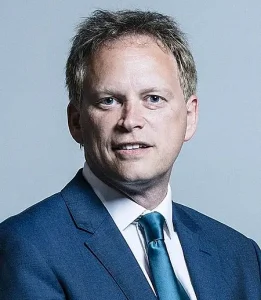
Energy Security Secretary Grant Shapps. Photo by Chris McAndrew. Wikimedia
Energy Security Secretary Grant Shapps said:
We have seen over the past year what can happen when global energy supplies are disrupted, and a tyrant like Putin uses energy as a weapon.
Access to cheap, abundant and reliable energy provide the foundation stone of a thriving economy with our homes and businesses relying on it to deliver our future prosperity.
Following our unprecedented cost of living support this Winter, which continues, this plan now sets out how we fix this problem in the long term to deliver wholesale UK electricity prices that rank amongst the cheapest in Europe, as we export our green growth expertise to the world.
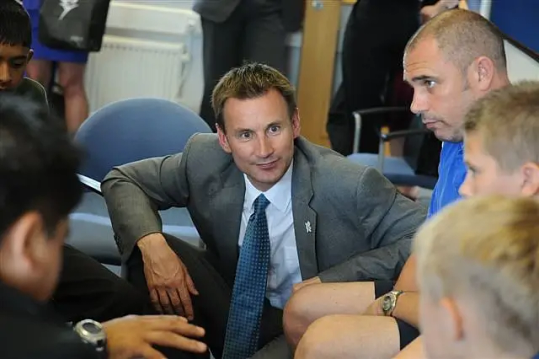
Jeremy Hunt, UK Chancelor of the Exchequer. Photo by Department for Digital, Culture, Media and Sport. Flickr.
Chancellor of the Exchequer Jeremy Hunt said:
Transforming our energy system is no longer just about tackling climate change, it is also a matter of national security. To protect ourselves from future price spikes, we need to accelerate the move to cleaner, cheaper, home-grown energy.
By unlocking billions of pounds of private capital through our Green Finance Strategy, we generate more of the energy we need in Britain and create new industries and jobs that are built to last.
Since 2010, the UK has seen £198 billion of investment into low carbon energy, through a mixture of government funding, private investment and levies on consumer bills. Going forward we anticipate around £100 billion of private investment will be forthcoming into the UK’s energy revolution.
The UK has also broken numerous records in generating renewable electricity, leading the world in offshore wind – the UK is now in prime position to export its world-leading expertise.
This will drive green growth at home and abroad and see British businesses set the standard for a clean, secure and prosperous future.
Building on our COP26 Presidency and our role in agreeing the Global Biodiversity Framework, the UK will continue to lead international action in tackling climate change and biodiversity loss, working with our partners and delivering on our £11.6 billion International Climate Finance commitment.
The 2030 Strategic Framework for International Climate and Nature Action and the International Climate Finance Strategy set out today what this will look like in practice.
Sources: THX News, Department for Energy Security and Net Zero, The Rt Hon Grant Shapps MP, The Rt Hon Rishi Sunak MP & The Rt Hon Jeremy Hunt MP
Read the full article
#ChancelloroftheExchequer#EnergySecurity#EnergySecuritySecretaryGrantShapps#JeremyHunt#PrimeMinisterRishiSunak#TransformUKEnergy#UKFuelSecurity
0 notes
Text

વડા પ્રધાન ઋષિ સુનકની નવી કેબિનેટ - Prime Minister Rishi Sunak's New Cabinet
#PrimeMinisterRishiSunak#topcabinetteam#KingCharles#appointmentofministers#InternationalNews#GujaratiNewsUK#Breaking#Trending
0 notes
Text
UK Pioneers Global Food Security Solutions

Prime Minister Rishi Sunak to Announce Groundbreaking Initiative
In a major step toward addressing global food challenges, UK Prime Minister Rishi Sunak is set to unveil a groundbreaking initiative at the Global Food Security Summit in London on Monday, November 20th. The initiative includes the launch of a new science centre dedicated to developing climate-resilient crops and combatting severe child malnutrition.
International Collaboration at the Heart of New Science Centre
The newly announced science hub, led by CGIAR, a global research partnership uniting organizations focused on food security, aims to enhance global food systems' resilience in the face of climate change. This virtual center will foster collaboration between UK scientists and international research initiatives, focusing on the development of crops that can withstand climate change impacts and are more disease-resistant.
UK's Long-Term Approach to Global Food Challenges
The unveiling of the International Development White Paper, also expected at the summit, outlines the UK's new long-term approach to global food challenges. Going beyond traditional aid measures, the White Paper emphasizes collaboration with countries to tackle extreme poverty and climate change, addressing the root causes of food insecurity.
Addressing Global Drivers of Food Insecurity
The White Paper identifies climate change, conflict, the lingering effects of COVID-19, and Russia's invasion of Ukraine as the primary drivers of current food insecurity. Notably, the UK played a leading role in ensuring Ukraine's ability to continue agricultural exports, critical for global food security.
Priorities Outlined in the White Paper
Prime Minister Sunak emphasizes the need to address unseen causes of global food insecurity. The White Paper's priorities include mobilizing international finance, reforming the international system, promoting innovation, and prioritizing women and girls, ensuring equal opportunities for all.
Innovative Partnerships to Combat Child Malnutrition
International Development Minister Andrew Mitchell underscores the importance of combating child malnutrition. The UK, along with its partners, will launch the UK International Development White Paper, focusing on preventing and treating child wasting through innovative partnerships and financing.
Tackling Malnutrition Globally
The UK, in collaboration with CGIAR, has contributed to the development of flood-tolerant rice, disease-resistant wheat, and nutrient-rich sweet potatoes. The UK is releasing up to £100 million in humanitarian funding to address food insecurity in countries like Ethiopia, Sudan, South Sudan, Afghanistan, and those affected by climate-related events.
UK Support for Child Nutrition Fund
At the summit, Prime Minister Sunak announced increased support for the Child Nutrition Fund. This funding will scale up efforts in breastfeeding, infant feeding, healthcare, and monitoring to address and prevent severe child malnutrition. The UK's support will match the investments of severely affected countries, ensuring a more reliable supply of critical food for young children.
As the Global Food Security Summit unfolds, the UK's commitment to long-term solutions for global food challenges takes center stage, marking a significant step toward a healthier, more secure, and prosperous world.
Sources: THX News, Foreign Commonwealth and Development Office, The Rt Hon Rishi Sunak MP, & The Rt Hon Andrew Mitchell MP.
Read the full article
#AddressingGlobalFoodChallenges#CGIARScienceCentre#ChildMalnutritionSolutions#Climate-ResilientCrops#GlobalFoodSecuritySummit#InnovativeFoodSecurityInitiatives#InternationalDevelopmentWhitePaper#PreventingChildWasting#PrimeMinisterRishiSunak#UK'sLong-TermApproach
0 notes
Text
Rishi Sunak Stresses Unity During Remembrance

Honoring Sacrifice, Preserving Freedom
This weekend, as people across the UK prepare to gather in silent tribute to those who made the ultimate sacrifice for their country, Prime Minister Rishi Sunak acknowledges the profound debt owed to these heroes. Their sacrifice, he notes, has granted the UK an invaluable legacy of freedom and peace, and it is a legacy that must be held in the highest regard.
Protests and Principles
While Saturday's planned protest may be seen by some as a form of expression, Sunak is quick to stress that it stands on a thin line. He views the protest as not only disrespectful but as an affront to the nation's heartfelt gratitude for the memory of those who gave their all for freedom and peace.
Nonetheless, he emphasizes that the freedom to peacefully protest is an integral part of the legacy these heroes have bestowed upon the UK. The true test of this freedom, he believes, lies in whether the commitment to it can withstand the challenges posed by those who exercise it, even when their views differ.
A Meeting with Sir Mark Rowley
In light of the upcoming protests, Prime Minister Sunak has taken action. He requested a meeting with Metropolitan Police Commissioner, Sir Mark Rowley, at Downing Street. The aim of the meeting was to receive reassurances from the police regarding their preparations for safeguarding Remembrance services and ensuring the safety of those wishing to pay their respects across the country this weekend.
Police Measures and Public Safety
The Prime Minister welcomes the police's confirmation that the march will be directed away from the Cenotaph, a monument that holds immense significance in the UK's collective memory. Additionally, they have pledged to avoid scheduling conflicts with any Remembrance events.
Despite these assurances, there remains a concern about individuals who might exploit this occasion to foster division within society. This topic was a focal point of Sunak's discussion with Commissioner Rowley.
Vigilance and Support for Veterans
Prime Minister Sunak concludes by addressing the UK's veterans and their families. He vows to take all necessary measures to safeguard this important weekend, where the nation comes together to reflect on those who have safeguarded their freedom. In doing so, he emphasizes the importance of preserving the spirit of unity and remembrance during this time.
Sources: THX News, Prime Minister's Office 10 Downing Street & The Rt Hon Rishi Sunak MP.
Read the full article
#Cenotaphmarch#Divisiveprotests#MetropolitanPoliceCommissioner#PrimeMinisterRishiSunak#Remembranceweekend#Sacrificeandfreedom#SafeguardingRemembranceservices#Supportforveterans#UKprotests#Unityandreflection
0 notes
Link
#BuckinghamPalaceaudience#Commonwealthservice#HerLateMajesty'slegacy#HisMajestyTheKing#KingCharlesIII#Monarch'ssacredbond#PrimeMinisterRishiSunak#QueenElizabethII#QueenElizabethIIpassing#Remarkablelegacyofservice#RoyalFamilyreflection
0 notes
Text
Government Annouces £1B Boost for UK's Semiconductor Sector

- National Semiconductor Strategy reveals plan to double down on design, research and advanced chip leadership – securing the UK’s position as a global science and technology superpower
- chip plan sets out how UK will build on industry strengths, safeguard supply chains from disruption and protect tech against national security risks – supporting the delivery of the government’s priority to grow our economy
- government will invest up to £1 billion in the next decade to improve access to infrastructure, power more research and development and facilitate greater international cooperation, with up to £200 million over the years 2023-25
- follows UK and Japan commitment to establish ambitious collaboration in the semiconductor sector, covering R&D cooperation, skills exchanges, and improving the resilience of the semiconductor supply chain

National Semiconductor Strategy. Photo by GOV.UK.
The National Semiconductor Strategy sets out how up to £1 billion of government investment will boost the UK’s strengths and skills in design, R&D and compound semiconductors, while helping to grow domestic chip firms across the UK.
Working in tandem with industry, investment made by the government will drive research, innovation and commercialisation through the sector - helping to deliver products from lab to market.
It comes as the Prime Minister is at the G7 leaders’ Summit in Japan for discussions on strengthening our tech collaboration with like-minded economies and strengthening supply chains for critical technology like semiconductors.
Semiconductors are vitally important for the modern world we live in, being an essential component for the functioning of almost every electronic device we use. From phones and computers to ventilators and power stations, nearly every piece of technology in the world depends on them.
Over a trillion semiconductors are manufactured each year, with the global semiconductor market forecast to reach a total market size of $1 trillion by 2030. Semiconductors also underpin future technologies, such as artificial intelligence, quantum and 6G.
The strategy focuses on the UK’s particular areas of strategic advantage in the semiconductors sector – semiconductor design, cutting-edge compound semiconductors, and our world-leading R&D ecosystem - supported by UK universities from Cambridge to Cardiff and Manchester to Edinburgh demonstrating global leadership in this space.
Compound semiconductors do things silicon chips can’t, with use cases in evolving technologies such as autonomous driving and future telecoms. Their creation requires expertise in advanced materials, an area of UK science leadership.
To support the growth of the sector in the UK, the government will invest up to £200 million over the years 2023-25 to improve industry access to infrastructure, power more research and development and facilitate greater international cooperation.
Taking a strategic approach to investment over the next decade, the government will invest up to £1 billion in a range of measures to secure the UK’s advantage in this globally important sector and meet three key objectives:
- growing the domestic sector
- mitigating the risk of supply chain disruptions
- protecting our national security
The strategy builds on the consistent support the government has provided for the semiconductor industry, having provided £539 million in grants for research and £214 million directly to SMEs in the sector across the last 10 years, as well as funding 450 PhD students since 2017.

UK Prime Minister working at his desk in 10 Downing Street. Photo by UK.GOV.
Prime Minister Rishi Sunak said:
Semiconductors underpin the devices we use every day and will be crucial to advancing the technologies of tomorrow.
Our new strategy focuses our efforts on where our strengths lie, in areas like research and design, so we can build our competitive edge on the global stage.
By increasing the capabilities and resilience of our world-leading semiconductor industry, we will grow our economy, create new jobs and stay at the forefront of new technological breakthroughs.

Official portrait of Chloe Smith MP. Photo by Richard Townshend. Flickr.
Science, Innovation and Technology Secretary Chloe Smith said:
Semiconductors are the beating heart of all electronic devices, from powering our phones and cars to medical equipment and innovative new technologies like Quantum and AI which will make a real difference to all of our lives.
Britain is already a world leader when it comes to researching and designing semiconductor technology – our new strategy will double down on these core strengths to create more skilled jobs, grow our economy, boost our national security and cement the UK’s status as a global science and technology superpower.
The UK’s Integrated Review placed securing strategic advantage in science and technology at the heart of the UK’s national security and foreign policy.
In recognition of the fundamental importance of semiconductor technologies in these areas, the National Semiconductor Strategy demonstrates a clear vision for our position in the sector.
As part of the strategy, the UK will increase its cooperation with close partners, working together to manage national security threats and driving growth in the sector, while championing international cooperation to help develop a coordinated approach to supply chain resilience.
In Hiroshima this week, the UK and Japan committed to establishing an ambitious semiconductor partnership, led by the UK’s Department for Science, Innovation and Technology (DSIT) and Japan’s Ministry of Economy, Trade and Industry (METI).
It seeks to deliver new R&D cooperation, skills exchanges, and improving the resilience of the semiconductor supply chain for both countries.
UK Research and Innovation will work with the Japan Science and Technology Agency on a joint investment of up to £2 million in early stage semiconductor research next year.
This will support UK and Japanese researchers to work together on fundamental semiconductor technologies.
The strategy has been developed in close consultation with the semiconductor industry and academia, and the government will build on this partnership by creating a new UK Semiconductor Advisory Panel.
The Panel will bring together key figures from industry, government, and academia to work closely on shared solutions and implementation.
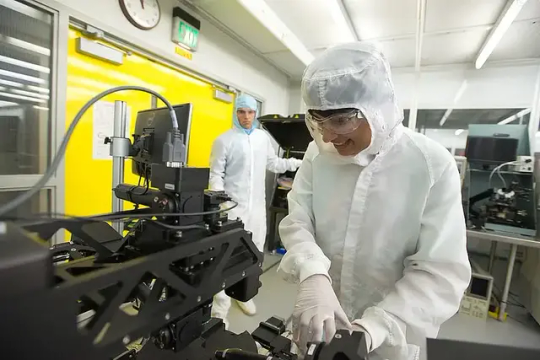
Srabanti Chowdhury. Photo by UC Davis College of Engineering. Flickr.
Growing the UK industry
The government will focus on growing the UK’s unique and already world-leading strengths in compound semiconductors, research and development, intellectual property and design by investing up to £200 million over the years 2023-25, and up to £1 billion in the next decade. This funding will be used to improve the talent pipeline and will make it easier for British firms to access things like prototyping, tools and business support.
These efforts will include investment in a new National Semiconductor Infrastructure Initiative to unlock the potential of British chip firms in these key areas. It will look at whether better access to prototyping facilities for chip firms is needed to tackle barriers to innovation and grow the industry. It will also explore opportunities to make specialist software tools more available for start-ups. The Department for Science, Innovation and Technology commissioned research that will look at the best way to establish the Infrastructure initiative. This will report its findings in the autumn.
Furthermore, the government will announce plans by the autumn on support for investment in the semiconductor manufacturing sector, particularly where they are critical to the UK tech ecosystem or the UK’s national security.
Further announcements include:
- a new UK Semiconductor Advisory Panel that brings together key figures from industry, government, and academia to work together to deliver the strategy. The Advisory Panel will speak on behalf of the sector and provide advice and feedback
- a specialist incubator pilot will focus on removing obstacles which hold semiconductor startups back from growth. The scheme, launching today, will provide industry with better access to technical resources as well as coaching and networking
- support for industry-led learning will ensure people can gain the skills the semiconductor industry needs. Programmes will provide opportunities for learning focused on the advanced skills needed for the sector, such as electrical and electronic engineering and computer science
Safeguarding supply chains
The journey of a semiconductor chip from lab to market can involve thousands of production stages taking place across the world, with various locations that have particularly concentrated production capabilities.
The surge in demand for consumer electronics during the pandemic demonstrated how global industries can be impacted by semiconductor supply issues. This strategy highlights the importance of collaboration with international allies to develop secure supply chain resilience.
The government will take steps to help sectors mitigate the impact of supply shortages in the future. The UK government also wants to protect critical sectors (essential services, healthcare, critical national infrastructure and defence) from disruptions that could cause risks to life, or national security. To help ensure the UK is better protected against future disruption the government commits to:
- mew guidance to be published to help businesses better understand risks and steps they can take to be more resilient against supply chain shocks
- continued collaboration through international initiatives - like the UK’s technology partnerships with the US, Japan, and the Republic of Korea - to explore shared approaches and solutions to improve global supply chain resilience
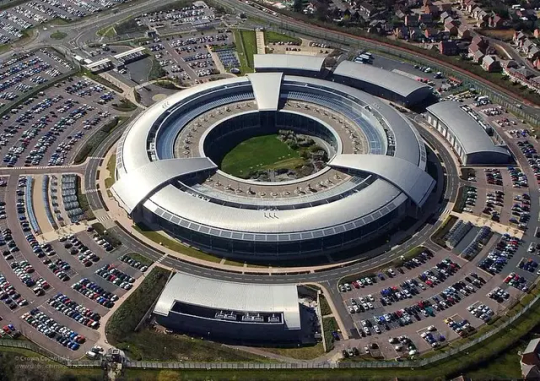
GCHQ Building at Cheltenham, Gloucestershire. Photo by Defence Images. Flickr.
Protect UK against security risks
Semiconductors can create vulnerabilities in the electronic devices they are used in, and these risks are becoming more significant as the use of internet connected devices increases. The government is clear that a compromise to the cyber security of the hardware behind every device powering modern life is not acceptable. The acquisition of chip firms can also present national security issues. The strategy announces actions to protect the UK against these security risks including:
- additional information on the government’s approach to using the National Security and Investment Act, providing information to the industry on what areas of the sector the government has seen particular concerns potentially arising to ensure technology remains securely protected
- The government will continue to support world-leading programmes like Digital Security by Design, which aims to ensure semiconductors can be more resilient and secure in the face of growing cyber threats
Sources: THX News, Department for Science - Innovation and Technology & The Rt Hon Chloe Smith MP.
Read the full article
#ChloeSmith#Globalsemiconductormarket#Innovation#PrimeMinisterRishiSunak#Science#Semiconductors#Technology#UKChips#UKSemiconductorProduction
1 note
·
View note
Text
Political Tension Rises as Ukraine Braces for the Spring Offensive
- Prime Minister will welcome President Zelenskyy to Chequers today for discussions following the Ukrainian President’s tour of European capitals
- Visit comes ahead of this week’s Council of Europe and G7 Summits where the PM will call for sustained global support for Ukraine’s fight to reclaim their sovereign territory
- PM will announce more military aid to support this effort, following last week’s confirmation that the UK has donated long-range precision missiles
President Zelenskyy has arrived in the UK this morning for discussions with the Prime Minister on Ukraine’s ongoing military resistance to Putin’s brutal invasion.
The President will update the Prime Minister on his meetings with European leaders over the weekend as Ukraine prepares for an intensified period of military activity.
This visit also comes ahead of the Council of Europe Summit in Iceland, which the Prime Minister will attend and President Zelenskyy will attend virtually, and the G7 Summit in Japan. The Prime Minister will use these gatherings to push for sustained international support for Ukraine, both in terms of military aid and long-term security assurances.
Destruction of Russian tanks by Ukrainian troops in Mariupol. Photo by Міністерство внутрішніх справ України. Wikimedia.
Last week the UK confirmed that we have provided Storm Shadow precision missiles to Ukraine. This is the first long-range cruise missile in Ukraine’s arsenal and will be critical in helping the country defend against the relentless bombardment of their critical national infrastructure.
Today the Prime Minister will confirm the further UK provision of hundreds of air defence missiles and further unmanned aerial systems including hundreds of new long-range attack drones with a range of over 200km. These will all be delivered over the coming months as Ukraine prepares to intensify its resistance to the ongoing Russian invasion.
This equipment will support Ukraine over the coming months in their anticipated military surge to counter Russian forces. During their meeting today the Prime Minister will discuss with President Zelenskyy what support Ukraine needs from the international community, both in terms of immediate military equipment and long-term defences.
The Prime Minister is working with partners in the G7, NATO and beyond to provide Ukraine with the kind of assurances and capabilities it needs to strengthen and guard its long-term security beyond the end of the war – putting Ukraine in the strongest possible position to seek a fair and lasting peace.
UK Prime Minister Rishi giving a speech outside 10 Downing Street, London. Photo by the UK Government.
The Prime Minister said:
“This is a crucial moment in Ukraine’s resistance to a terrible war of aggression they did not choose or provoke. They need the sustained support of the international community to defend against the barrage of unrelenting and indiscriminate attacks that have been their daily reality for over a year.
“We must not let them down. The frontlines of Putin’s war of aggression may be in Ukraine but the fault lines stretch all over the world. It is in all our interest to ensure Ukraine succeeds and Putin’s barbarism is not rewarded.
“That is why the UK is sustaining our support to Ukraine – from tanks to training, ammunition to armoured vehicles. And this message of solidarity will ring loud in all my meetings with fellow world leaders in the days ahead.”
President Zelenskyy will hold talks with the Prime Minister at Chequers, becoming the first world leader the Prime Minister has hosted at the residence. This visit follows President Zelenskyy’s visit to the UK in February, which was only the second time the leader had left Ukraine since Putin’s full-scale invasion in February 2022.
In their talks, the Prime Minister will reiterate the importance the UK places on providing a total package of support to Ukraine to put them in the strongest possible position to secure a lasting peace for their country.
This means the military equipment we provide must be bolstered by training, by economic support, by biting sanctions against Putin’s regime and by long-term security assurances to ensure Ukraine’s sovereignty can never be breached in this way again.
To that end, in the last year the UK has trained 15,000 Ukrainian troops to battlefield readiness. In February the Prime Minister announced the UK would develop a new training programme for Ukrainian pilots to support their efforts to build a new Ukrainian air force with NATO-standard, F16 jets.
UK Offensive Ops. Photo by 7th Army Training Command. Flickr.
Training in the UK
This summer we will commence an elementary flying phase for cohorts of Ukrainian pilots to learn basic training. This will adapt the program used by UK pilots to provide Ukrainians with piloting skills they can apply a different kind of aircraft.
This training goes hand in hand with UK efforts to work with other countries on providing F16 jets – Ukraine’s fighter jets of choice.
Next month the UK will host a Ukraine Recovery Conference to galvanise international investment to support Ukraine’s reconstruction, promoting those emerging sectors where the country was thriving before Putin’s full-scale invasion such as clean energy and tech.
The UK provided £2.3 billion worth of military support to Ukraine in 2022 – more than any country other than the US – and the Prime Minister has committed to sustain that level of support this year.
So far in 2023 the UK has provided equipment including a squadron of Challenger 2 main battle tanks, self-propelled guns, hundreds of armoured vehicles and sophisticated missiles including Starstreak and Storm Shadow. Today’s announcements are further to these previous donations.
Since the outbreak of full-scale war the UK has also trained 15,000 Ukrainian troops in the UK, on top of the 22,000 troops trained in Ukraine between 2014 and 2022 under Operation Orbital.
Sources: THX News, Prime Minister's Office - 10 Downing Street & The Rt Hon Rishi Sunak MP.
Read the full article
#Chequers#G7Summit#Militarytraining#OperationOrbital#PresidentZelenskyy#PrimeMinisterRishiSunak#Putin#Russia#RussianTroops#SpingOffensive#SpringOffensive#Ukrainiantroops
0 notes
Text
PM On Whistle-Stop Tour This Week Inc. G7 Summit
- Prime Minister will travel to the Council of Europe followed by Tokyo and the G7 Summit in Hiroshima this week
- The focus in Iceland will be on the threat posed by Russia and collective efforts to prevent illegal migration
- In Japan, the PM will drive new investment wins and G7 action on economic security and support for Ukraine
UK Prime Minister working at his desk in 10 Downing Street. Photo by UK.GOV.
Prime Minister Rishi Sunak will undertake a packed tour of international engagements this week to drive economic growth and investment in the UK, shore up support for Ukraine and address critical global challenges like illegal migration.
On the 16th of May, the Prime Minister will attend the Council of Europe Summit in Iceland. The Council of Europe is the continent’s oldest multilateral institution and has played a defining role promoting freedom and democracy for over 70 years.
He will use his engagements at the Summit to discuss the importance of strengthening Europe’s borders – tackling illegal migration and the threat posed by Russia to safeguard our security and prosperity.
The Prime Minister will then travel on to Tokyo for a bilateral visit ahead of the G7, where he is expected to announce new UK-Japan defence and technology collaboration and host a reception of business leaders to deliver major new investments into the UK.
After a day in Tokyo he will head to Hiroshima to attend the G7 Summit, in a historic first visit by a British Prime Minister to the city.
At the G7, the UK will galvanise international action on economic coercion by hostile states and shore up support for Ukraine, as they prepare for escalating military action against Russia’s war of aggression.

New UK Prime Minister Rishi Sunak. Source UK Government. 25th October 2022.
Speaking ahead of the visits, Prime Minister Rishi Sunak said:
“This week I will be travelling from Reykjavik to Hiroshima to drive global action on our most pressing priorities.
“Many of the challenges we are dealing with, from inflation to migration, must be solved by working closely with our international partners.
“I look forward to visiting Japan, a vital economic and defence partner for the UK in the Indo-Pacific. This year’s G7 Summit in Hiroshima comes at a pivotal moment, as Ukraine doubles down in its fight for survival and we deal with complex threats to global peace and prosperity.”
In his first G7 Summit as Prime Minister, Rishi Sunak will hold talks on Ukraine and Indo-Pacific security, economic policy and state threats, and global sustainable infrastructure investment. He is expected to hold a number of bilateral meetings alongside the Summit sessions.
More detail on the Prime Minister’s visit to the Council of Europe and travel to Tokyo and Hiroshima will be set out in the week.
Sources: THX News, Prime Minister's Office & The Rt Hon Rishi Sunak MP.
Read the full article
#CouncilofEurope#G7Summit#PMTour#PrimeMinister#PrimeMinisterRishiSunak#RishiSunak#Tokyo#UKPM#Whistle-StopTour
0 notes